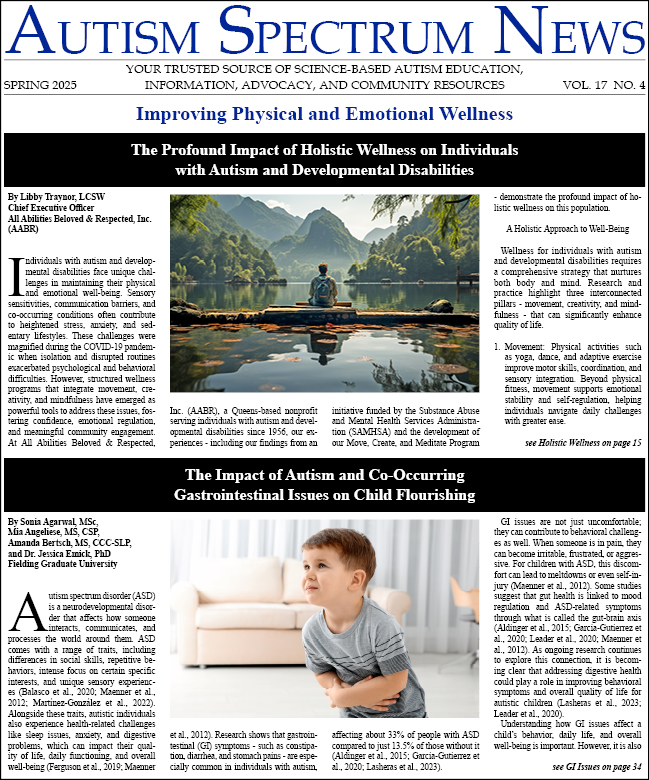The dangers and hazards of the world that are faced by autistic children and adolescents are very well known, and much has been said and written about them. Adults with autism, however, all too often face a variety of threats not frequently encountered by neurotypicals. I will be discussing these from the perspective of an adult with autism who has been susceptible to them during the course of his life and, as such, is able to recognize the dangers they can present to other autistics (I am not an autism professional – these are strictly my personal views). I will also draw upon the many stories that I have heard over the years of my involvement with the autism community.

Karl Wittig, P.E., Advisory Board Chair
This issue, for me at least, is typified by a story I have heard at many autism gatherings, on numerous occasions, and in various forms. It usually goes something like this: a young person on the spectrum is approached by strangers (perhaps acquaintances from their schools or communities) who present an attractive offer. In exchange for delivering a package (usually of unspecified content) to a particular location, they are invited to a party or gathering with the prospect of meeting people, making friends, and even finding romantic partners. Of course, the autistic does not realize that the package contains illicit drugs or other contraband, the legal consequences for being caught with being very severe.
A few things immediately strike me about these stories whenever I hear them. First, the perpetrators of such schemes are somehow able to recognize autistics as being susceptible to them (in particular, their obliviousness to both the deliberate deception and its potential consequences), even though they most likely have never even heard of the autism spectrum, let alone realize that their prospective targets are on it. Second, they know to use the possibility of finding friends as an inducement, as opposed to the usual offer of financial reward for taking the risks incurred from engaging in illegal activities. As such, neurotypicals, who are much less likely to fall for such a scam, will not be subjected to it nearly as often as are autistics, who tragically fall for it all too often. This is a prime example of dangers that specifically affect autistics as a group which, as such, needs to be emphatically warned about so that they learn to recognize and, hopefully, not become victims of. Family members and friends, as well as teachers and professionals, who have autistics in their lives also need to be made aware of such hazards and become vigilant for them.
Deception and Exploitation
The main reason adults with autism are so much more susceptible to such schemes is their inability to recognize that the perpetrators are intentionally deceiving them and do not have their best interests in mind. This may very well be due to the impaired theory-of-mind (i.e., ability to see things from the perspective of another individual) that autistics are known to have. Although this notion is not well received or even accepted by many in autism community, mainly because it has been grossly extrapolated to imply that autistics are incapable of empathy (a view which has been largely discredited), it is far less of a stretch to conclude that such a deficit may actually be responsible for their well-known challenges in recognizing deception on the part of another person. This needs to be further investigated, as it could help better understand this serious hazard that autistics so frequently encounter and thereby help them to not fall victim to it.
Whatever the reason for these deficits, adults with autism need to be taught, as much as possible, that there are people in this world who will deceive and take advantage of them given the opportunity, and how to recognize such situations when they arise. Although the earlier example was used for its extreme consequences, there are many other situations where the same considerations apply. These can involve taking financial advantage of an unsuspecting victim or, as often happens with autistics, persuading them to do something that will embarrass them for the entertainment of others. For an autistic with known special interests or abilities, these can serve as inducements to lure them into disadvantageous or dangerous activities as well; such interests can be used the same way that the prospect of friendship is. If the autistic is academically talented, or has abilities related to subjects in school, they can often be persuaded to do class assignments for others (as happened to me years ago as a student) or even assist in cheating on examinations; this can result in academic code violations and have damaging consequences to the autistic, for whom success in an area of interest often provides the greatest hope of a positive future outcome. With older adults, a similar situation exists when an employed individual enlists an unemployed autistic to do work for which the non-autistic gets paid.
The Internet and Illegal Activity
A new class of dangers for adults with autism in the modern age is found on the internet. Many of the same predators who have long victimized autistics can now be found on social media and other online venues. These dangers have long been publicized for various non-autistic populations (the lonely, the isolated, the elderly, etc.), and are similar in both the inducements (friendship, acceptance, romance, etc.) and hazards (e.g., taking financial advantage) as more traditional scams, but once again autistics are especially susceptible to such predations. The element of electronic communication, as opposed to direct personal interaction, further complicates matters because it creates additional layers that can be used to conceal the deceptions.
Internet websites that involve illegal activities can be especially dangerous, because they are often monitored by law enforcement agencies which have capabilities to determine the locations of users that are accessing them. Of particular concern are sites that contain child pornography, information about weapons and explosives, or other materials that are illegal to possess or even look at. Unfortunately, a significant number of autistics have been known to browse such websites, sometimes quite extensively, purely out of their intense curiosity. They have no malicious intent whatsoever, but nevertheless attract the attention of officials who are monitoring the sites. In more than a few instances, this has led to the arrest of such autistics, who then faced severe legal repercussions. Autistics need to be made aware of this danger, taught to recognize and avoid any sites that might present hazards for them, and impressed upon them the capability of law enforcement to locate their computers (using internet addresses), track them down, arrest them, and confiscate the computers for evidence. These issues can easily be explained to the many autistics that are knowledgeable about computer technology; they perhaps can in turn be enlisted to help explain them to other autistics who are less so inclined.
Bullying
Another very common danger faced by autistics of all ages is the problem of bullying (physical, verbal, etc.), be it in schools (at all levels), workplaces, or local communities. For those on the autism spectrum, bullying needs to be seen as nothing less than the victimization by one person with greater influence or power of another who is unable even to understand what is happening, let alone why it is being done. Also, autistics in any and all circumstances need to be provided with someone to whom they can report bullying, and who can help them address it in a manner that does not lead to further repercussions; this can range from practical advice about how to deal with such a situation to proactively taking whatever action is needed to stop the bullying. The fact that autistics are far more susceptible to bullying than most of the typical population also needs to be more widely recognized.
Alcohol
Finally, many hazards that are faced by anyone in our society can affect autistics in a different and possibly unique manner. An example of this is the decision whether or not to consume alcohol and the understanding of its potential dangers, most of which are the same for autistics as they are for anybody. Because drinking is a part of so many social activities, however, it is very easy for an autistic person with deficient social skills to get the impression that alcohol can benefit them in such situations, especially when they see others having successful interactions in these settings (I actually believed this at one time in my youth). What is in fact happening is that the alcohol reduces their social anxieties (this well-known effect of alcohol is actually regarded by some to be a legitimate use), but in no way enhances their social abilities. While this may seem like a minor technical point to most neurotypicals, it is of far greater importance to adults with autism who, whatever choices they might make, need to understand that alcohol functions as a drug that reduces inhibitions and is not “liquid social skills.”
Conclusion
There are numerous other dangers and hazards which mainly affect autistics; I have only addressed a few that I could think of and that space permits me to discuss. These need to be identified, perhaps using the life experiences and stories of adult autistics as a guide, which can in turn be used to inform those who live and work with autistics so that they can be vigilant about them and serve as cautionary tales for autistics themselves.
Karl may be contacted at kwittig@earthlink.net.





